SOC355: Curbing Fake News and Its Impact on Singapore Society
VerifiedAdded on 2023/04/23
|10
|2234
|56
Essay
AI Summary
This essay provides a sociological analysis of fake news in Singapore, prompted by Senior Minister Janil Puthucheary's concerns. It examines the ways fake news poses a threat to Singaporean society, considering its role as a contemporary white-collar crime, causing disharmony and potentially destabilizing the nation. The essay then delves into the legal measures and social sanctions recommended by the Select Committee to combat fake news, evaluating their potential impact on media freedom of expression. It references course concepts like media representation of crime, the classification of crime and conflict theories, and compares Singapore's context with other nations. The essay underscores the need for a multifaceted approach to address fake news, balancing the protection of societal integrity with the preservation of media freedom.
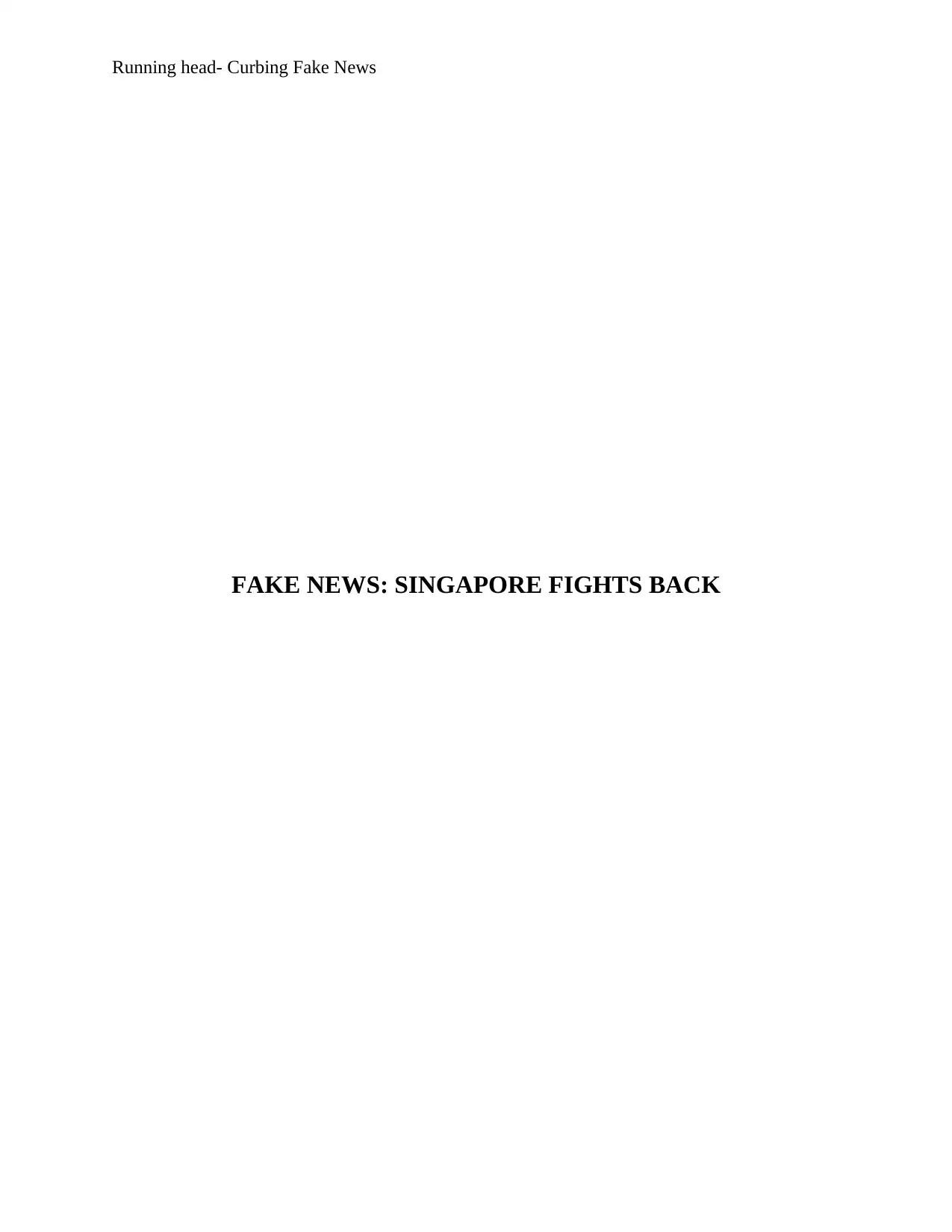
Running head- Curbing Fake News
FAKE NEWS: SINGAPORE FIGHTS BACK
FAKE NEWS: SINGAPORE FIGHTS BACK
Paraphrase This Document
Need a fresh take? Get an instant paraphrase of this document with our AI Paraphraser
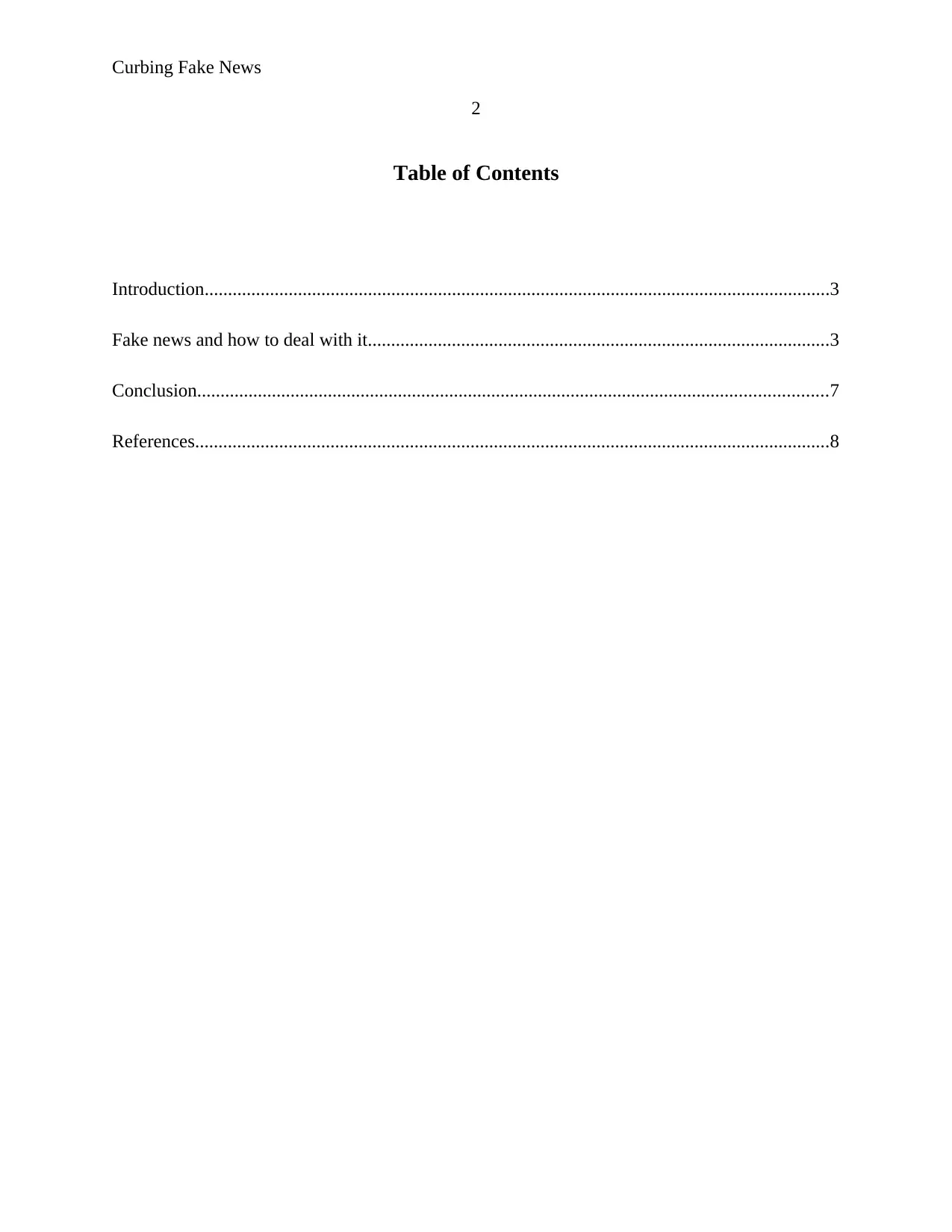
Curbing Fake News
2
Table of Contents
Introduction......................................................................................................................................3
Fake news and how to deal with it...................................................................................................3
Conclusion.......................................................................................................................................7
References........................................................................................................................................8
2
Table of Contents
Introduction......................................................................................................................................3
Fake news and how to deal with it...................................................................................................3
Conclusion.......................................................................................................................................7
References........................................................................................................................................8
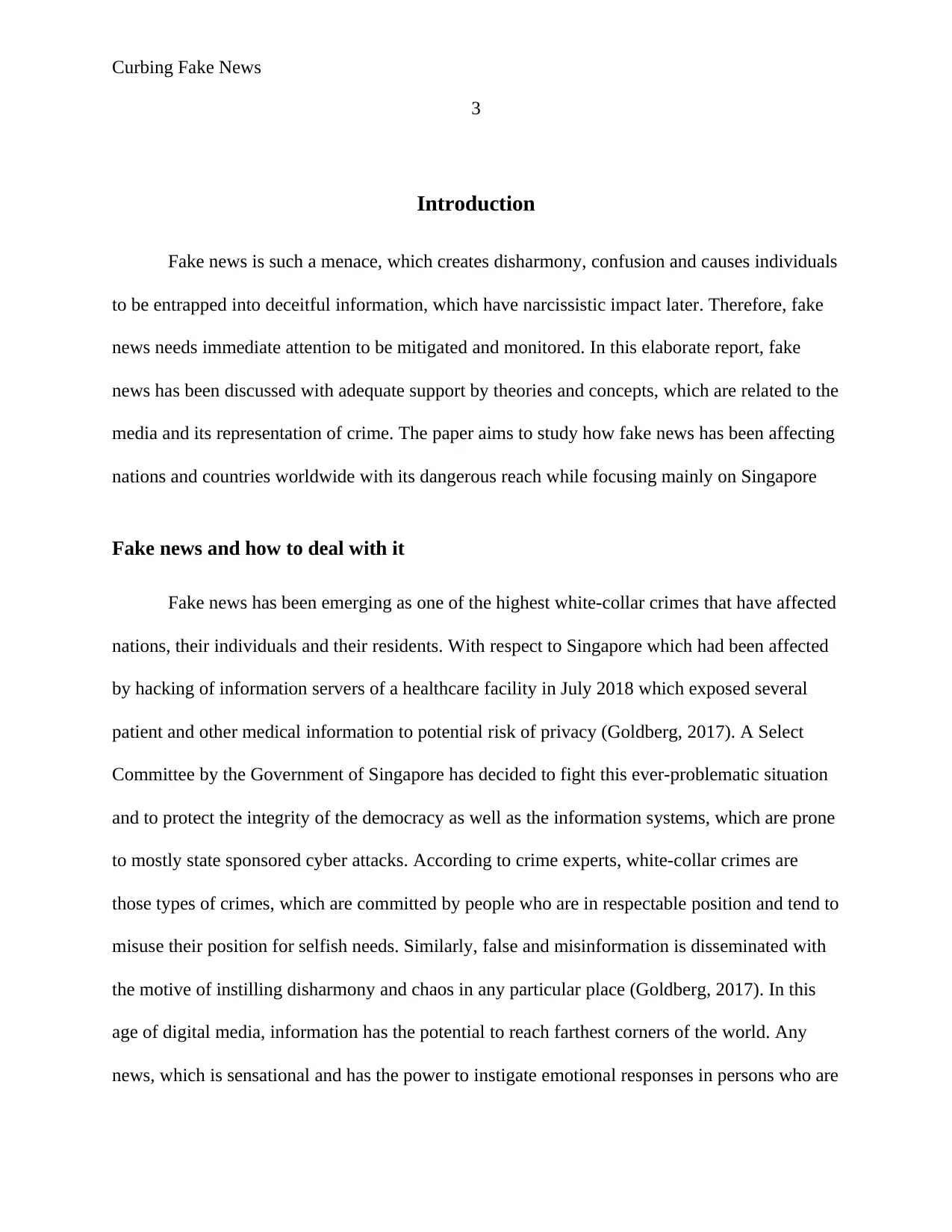
Curbing Fake News
3
Introduction
Fake news is such a menace, which creates disharmony, confusion and causes individuals
to be entrapped into deceitful information, which have narcissistic impact later. Therefore, fake
news needs immediate attention to be mitigated and monitored. In this elaborate report, fake
news has been discussed with adequate support by theories and concepts, which are related to the
media and its representation of crime. The paper aims to study how fake news has been affecting
nations and countries worldwide with its dangerous reach while focusing mainly on Singapore
Fake news and how to deal with it
Fake news has been emerging as one of the highest white-collar crimes that have affected
nations, their individuals and their residents. With respect to Singapore which had been affected
by hacking of information servers of a healthcare facility in July 2018 which exposed several
patient and other medical information to potential risk of privacy (Goldberg, 2017). A Select
Committee by the Government of Singapore has decided to fight this ever-problematic situation
and to protect the integrity of the democracy as well as the information systems, which are prone
to mostly state sponsored cyber attacks. According to crime experts, white-collar crimes are
those types of crimes, which are committed by people who are in respectable position and tend to
misuse their position for selfish needs. Similarly, false and misinformation is disseminated with
the motive of instilling disharmony and chaos in any particular place (Goldberg, 2017). In this
age of digital media, information has the potential to reach farthest corners of the world. Any
news, which is sensational and has the power to instigate emotional responses in persons who are
3
Introduction
Fake news is such a menace, which creates disharmony, confusion and causes individuals
to be entrapped into deceitful information, which have narcissistic impact later. Therefore, fake
news needs immediate attention to be mitigated and monitored. In this elaborate report, fake
news has been discussed with adequate support by theories and concepts, which are related to the
media and its representation of crime. The paper aims to study how fake news has been affecting
nations and countries worldwide with its dangerous reach while focusing mainly on Singapore
Fake news and how to deal with it
Fake news has been emerging as one of the highest white-collar crimes that have affected
nations, their individuals and their residents. With respect to Singapore which had been affected
by hacking of information servers of a healthcare facility in July 2018 which exposed several
patient and other medical information to potential risk of privacy (Goldberg, 2017). A Select
Committee by the Government of Singapore has decided to fight this ever-problematic situation
and to protect the integrity of the democracy as well as the information systems, which are prone
to mostly state sponsored cyber attacks. According to crime experts, white-collar crimes are
those types of crimes, which are committed by people who are in respectable position and tend to
misuse their position for selfish needs. Similarly, false and misinformation is disseminated with
the motive of instilling disharmony and chaos in any particular place (Goldberg, 2017). In this
age of digital media, information has the potential to reach farthest corners of the world. Any
news, which is sensational and has the power to instigate emotional responses in persons who are
⊘ This is a preview!⊘
Do you want full access?
Subscribe today to unlock all pages.

Trusted by 1+ million students worldwide
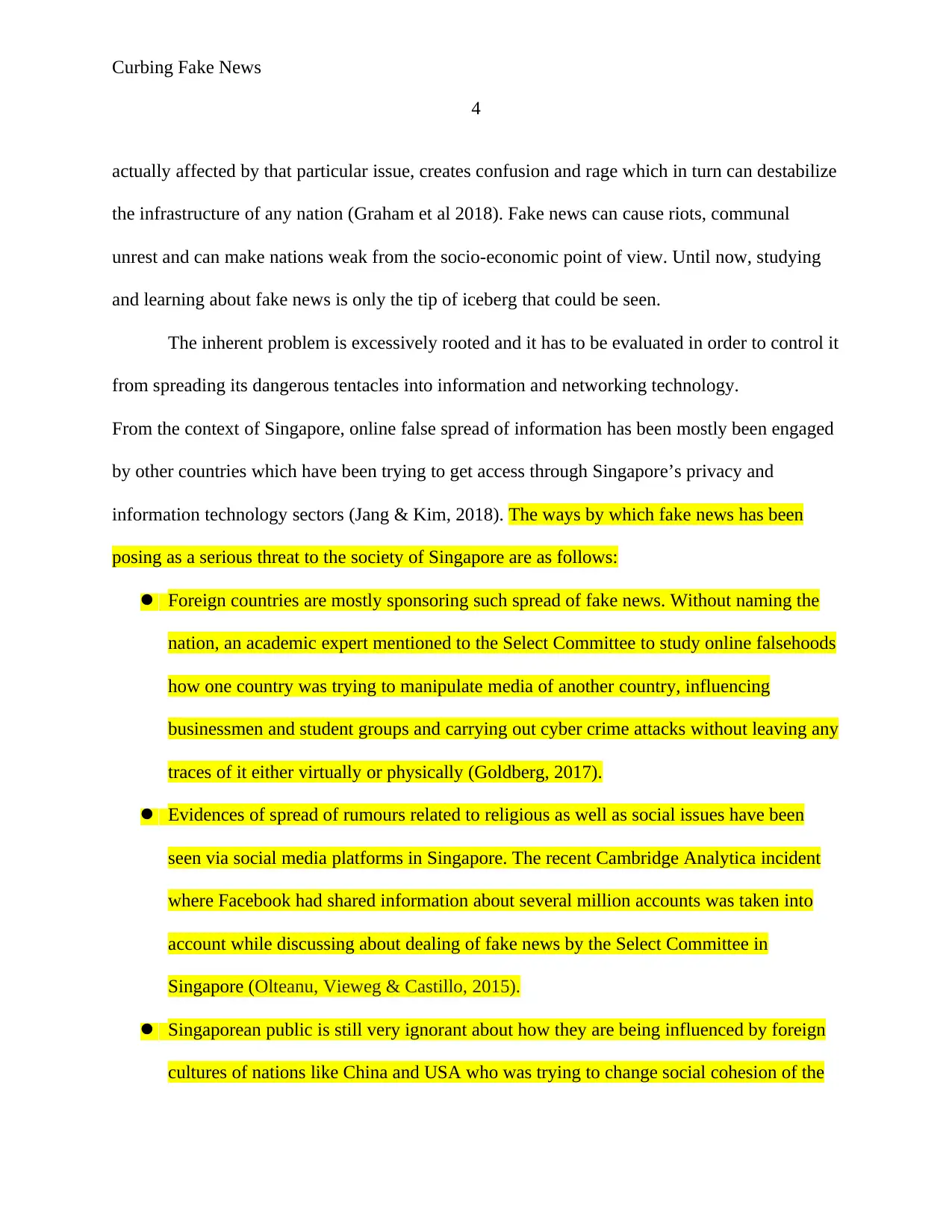
Curbing Fake News
4
actually affected by that particular issue, creates confusion and rage which in turn can destabilize
the infrastructure of any nation (Graham et al 2018). Fake news can cause riots, communal
unrest and can make nations weak from the socio-economic point of view. Until now, studying
and learning about fake news is only the tip of iceberg that could be seen.
The inherent problem is excessively rooted and it has to be evaluated in order to control it
from spreading its dangerous tentacles into information and networking technology.
From the context of Singapore, online false spread of information has been mostly been engaged
by other countries which have been trying to get access through Singapore’s privacy and
information technology sectors (Jang & Kim, 2018). The ways by which fake news has been
posing as a serious threat to the society of Singapore are as follows:
Foreign countries are mostly sponsoring such spread of fake news. Without naming the
nation, an academic expert mentioned to the Select Committee to study online falsehoods
how one country was trying to manipulate media of another country, influencing
businessmen and student groups and carrying out cyber crime attacks without leaving any
traces of it either virtually or physically (Goldberg, 2017).
Evidences of spread of rumours related to religious as well as social issues have been
seen via social media platforms in Singapore. The recent Cambridge Analytica incident
where Facebook had shared information about several million accounts was taken into
account while discussing about dealing of fake news by the Select Committee in
Singapore (Olteanu, Vieweg & Castillo, 2015).
Singaporean public is still very ignorant about how they are being influenced by foreign
cultures of nations like China and USA who was trying to change social cohesion of the
4
actually affected by that particular issue, creates confusion and rage which in turn can destabilize
the infrastructure of any nation (Graham et al 2018). Fake news can cause riots, communal
unrest and can make nations weak from the socio-economic point of view. Until now, studying
and learning about fake news is only the tip of iceberg that could be seen.
The inherent problem is excessively rooted and it has to be evaluated in order to control it
from spreading its dangerous tentacles into information and networking technology.
From the context of Singapore, online false spread of information has been mostly been engaged
by other countries which have been trying to get access through Singapore’s privacy and
information technology sectors (Jang & Kim, 2018). The ways by which fake news has been
posing as a serious threat to the society of Singapore are as follows:
Foreign countries are mostly sponsoring such spread of fake news. Without naming the
nation, an academic expert mentioned to the Select Committee to study online falsehoods
how one country was trying to manipulate media of another country, influencing
businessmen and student groups and carrying out cyber crime attacks without leaving any
traces of it either virtually or physically (Goldberg, 2017).
Evidences of spread of rumours related to religious as well as social issues have been
seen via social media platforms in Singapore. The recent Cambridge Analytica incident
where Facebook had shared information about several million accounts was taken into
account while discussing about dealing of fake news by the Select Committee in
Singapore (Olteanu, Vieweg & Castillo, 2015).
Singaporean public is still very ignorant about how they are being influenced by foreign
cultures of nations like China and USA who was trying to change social cohesion of the
Paraphrase This Document
Need a fresh take? Get an instant paraphrase of this document with our AI Paraphraser
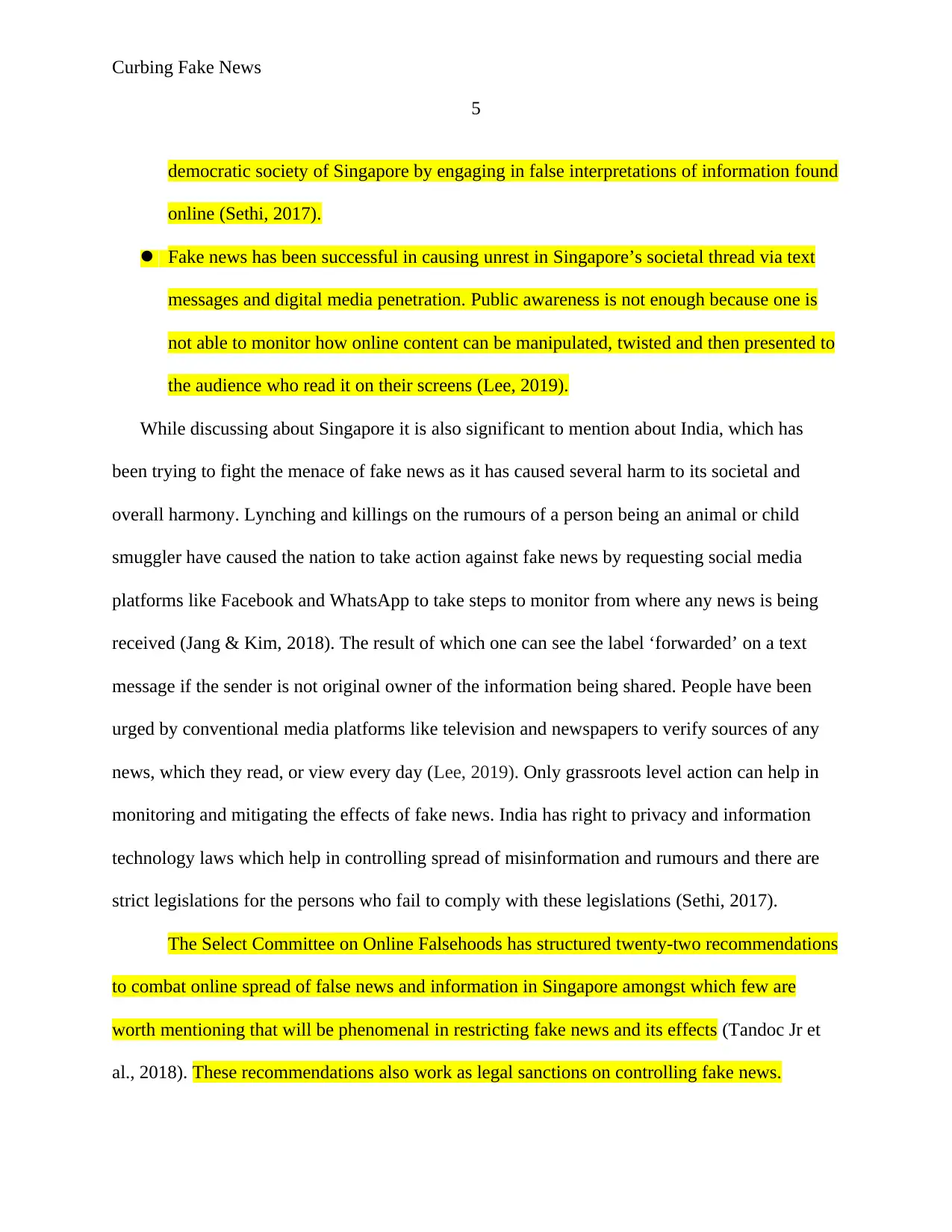
Curbing Fake News
5
democratic society of Singapore by engaging in false interpretations of information found
online (Sethi, 2017).
Fake news has been successful in causing unrest in Singapore’s societal thread via text
messages and digital media penetration. Public awareness is not enough because one is
not able to monitor how online content can be manipulated, twisted and then presented to
the audience who read it on their screens (Lee, 2019).
While discussing about Singapore it is also significant to mention about India, which has
been trying to fight the menace of fake news as it has caused several harm to its societal and
overall harmony. Lynching and killings on the rumours of a person being an animal or child
smuggler have caused the nation to take action against fake news by requesting social media
platforms like Facebook and WhatsApp to take steps to monitor from where any news is being
received (Jang & Kim, 2018). The result of which one can see the label ‘forwarded’ on a text
message if the sender is not original owner of the information being shared. People have been
urged by conventional media platforms like television and newspapers to verify sources of any
news, which they read, or view every day (Lee, 2019). Only grassroots level action can help in
monitoring and mitigating the effects of fake news. India has right to privacy and information
technology laws which help in controlling spread of misinformation and rumours and there are
strict legislations for the persons who fail to comply with these legislations (Sethi, 2017).
The Select Committee on Online Falsehoods has structured twenty-two recommendations
to combat online spread of false news and information in Singapore amongst which few are
worth mentioning that will be phenomenal in restricting fake news and its effects (Tandoc Jr et
al., 2018). These recommendations also work as legal sanctions on controlling fake news.
5
democratic society of Singapore by engaging in false interpretations of information found
online (Sethi, 2017).
Fake news has been successful in causing unrest in Singapore’s societal thread via text
messages and digital media penetration. Public awareness is not enough because one is
not able to monitor how online content can be manipulated, twisted and then presented to
the audience who read it on their screens (Lee, 2019).
While discussing about Singapore it is also significant to mention about India, which has
been trying to fight the menace of fake news as it has caused several harm to its societal and
overall harmony. Lynching and killings on the rumours of a person being an animal or child
smuggler have caused the nation to take action against fake news by requesting social media
platforms like Facebook and WhatsApp to take steps to monitor from where any news is being
received (Jang & Kim, 2018). The result of which one can see the label ‘forwarded’ on a text
message if the sender is not original owner of the information being shared. People have been
urged by conventional media platforms like television and newspapers to verify sources of any
news, which they read, or view every day (Lee, 2019). Only grassroots level action can help in
monitoring and mitigating the effects of fake news. India has right to privacy and information
technology laws which help in controlling spread of misinformation and rumours and there are
strict legislations for the persons who fail to comply with these legislations (Sethi, 2017).
The Select Committee on Online Falsehoods has structured twenty-two recommendations
to combat online spread of false news and information in Singapore amongst which few are
worth mentioning that will be phenomenal in restricting fake news and its effects (Tandoc Jr et
al., 2018). These recommendations also work as legal sanctions on controlling fake news.
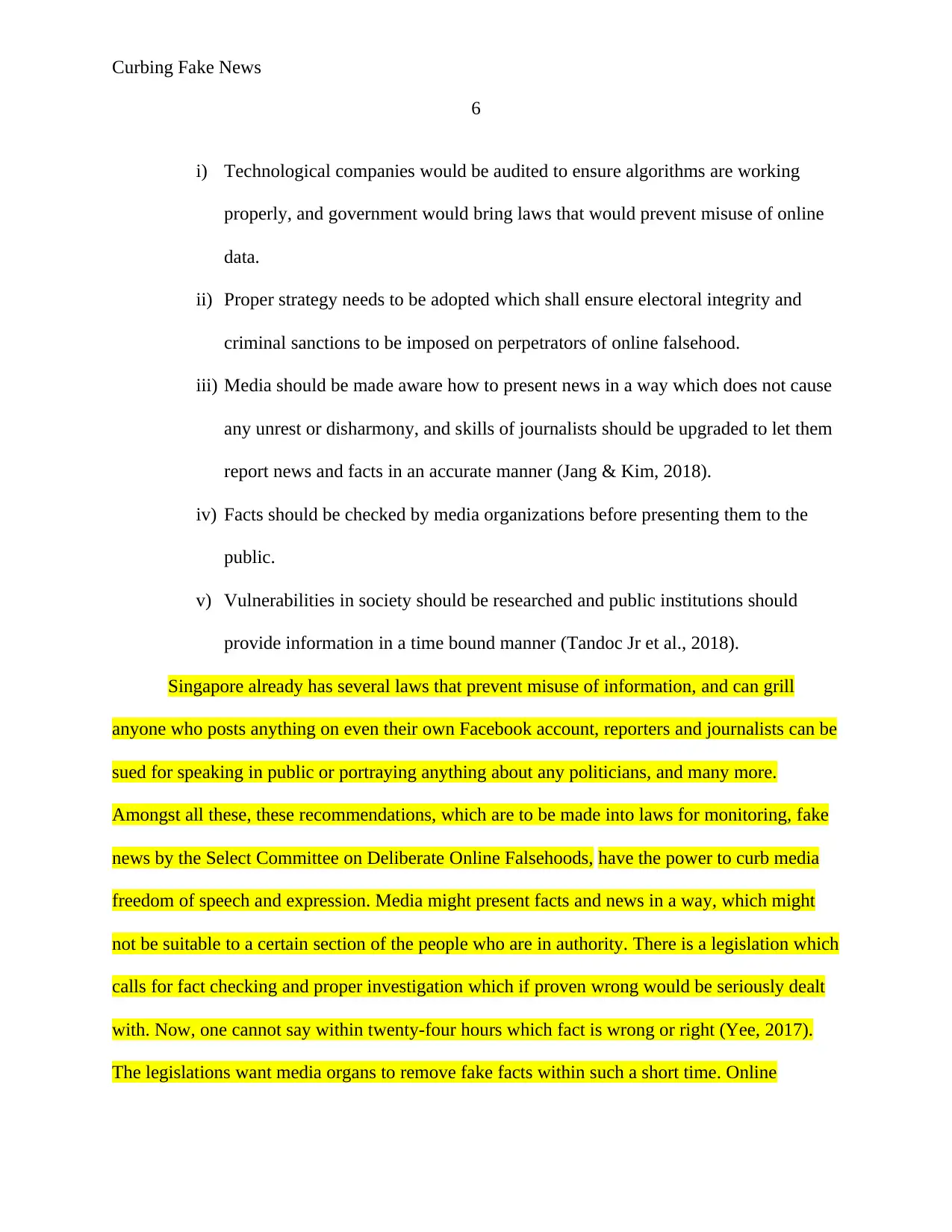
Curbing Fake News
6
i) Technological companies would be audited to ensure algorithms are working
properly, and government would bring laws that would prevent misuse of online
data.
ii) Proper strategy needs to be adopted which shall ensure electoral integrity and
criminal sanctions to be imposed on perpetrators of online falsehood.
iii) Media should be made aware how to present news in a way which does not cause
any unrest or disharmony, and skills of journalists should be upgraded to let them
report news and facts in an accurate manner (Jang & Kim, 2018).
iv) Facts should be checked by media organizations before presenting them to the
public.
v) Vulnerabilities in society should be researched and public institutions should
provide information in a time bound manner (Tandoc Jr et al., 2018).
Singapore already has several laws that prevent misuse of information, and can grill
anyone who posts anything on even their own Facebook account, reporters and journalists can be
sued for speaking in public or portraying anything about any politicians, and many more.
Amongst all these, these recommendations, which are to be made into laws for monitoring, fake
news by the Select Committee on Deliberate Online Falsehoods, have the power to curb media
freedom of speech and expression. Media might present facts and news in a way, which might
not be suitable to a certain section of the people who are in authority. There is a legislation which
calls for fact checking and proper investigation which if proven wrong would be seriously dealt
with. Now, one cannot say within twenty-four hours which fact is wrong or right (Yee, 2017).
The legislations want media organs to remove fake facts within such a short time. Online
6
i) Technological companies would be audited to ensure algorithms are working
properly, and government would bring laws that would prevent misuse of online
data.
ii) Proper strategy needs to be adopted which shall ensure electoral integrity and
criminal sanctions to be imposed on perpetrators of online falsehood.
iii) Media should be made aware how to present news in a way which does not cause
any unrest or disharmony, and skills of journalists should be upgraded to let them
report news and facts in an accurate manner (Jang & Kim, 2018).
iv) Facts should be checked by media organizations before presenting them to the
public.
v) Vulnerabilities in society should be researched and public institutions should
provide information in a time bound manner (Tandoc Jr et al., 2018).
Singapore already has several laws that prevent misuse of information, and can grill
anyone who posts anything on even their own Facebook account, reporters and journalists can be
sued for speaking in public or portraying anything about any politicians, and many more.
Amongst all these, these recommendations, which are to be made into laws for monitoring, fake
news by the Select Committee on Deliberate Online Falsehoods, have the power to curb media
freedom of speech and expression. Media might present facts and news in a way, which might
not be suitable to a certain section of the people who are in authority. There is a legislation which
calls for fact checking and proper investigation which if proven wrong would be seriously dealt
with. Now, one cannot say within twenty-four hours which fact is wrong or right (Yee, 2017).
The legislations want media organs to remove fake facts within such a short time. Online
⊘ This is a preview!⊘
Do you want full access?
Subscribe today to unlock all pages.

Trusted by 1+ million students worldwide
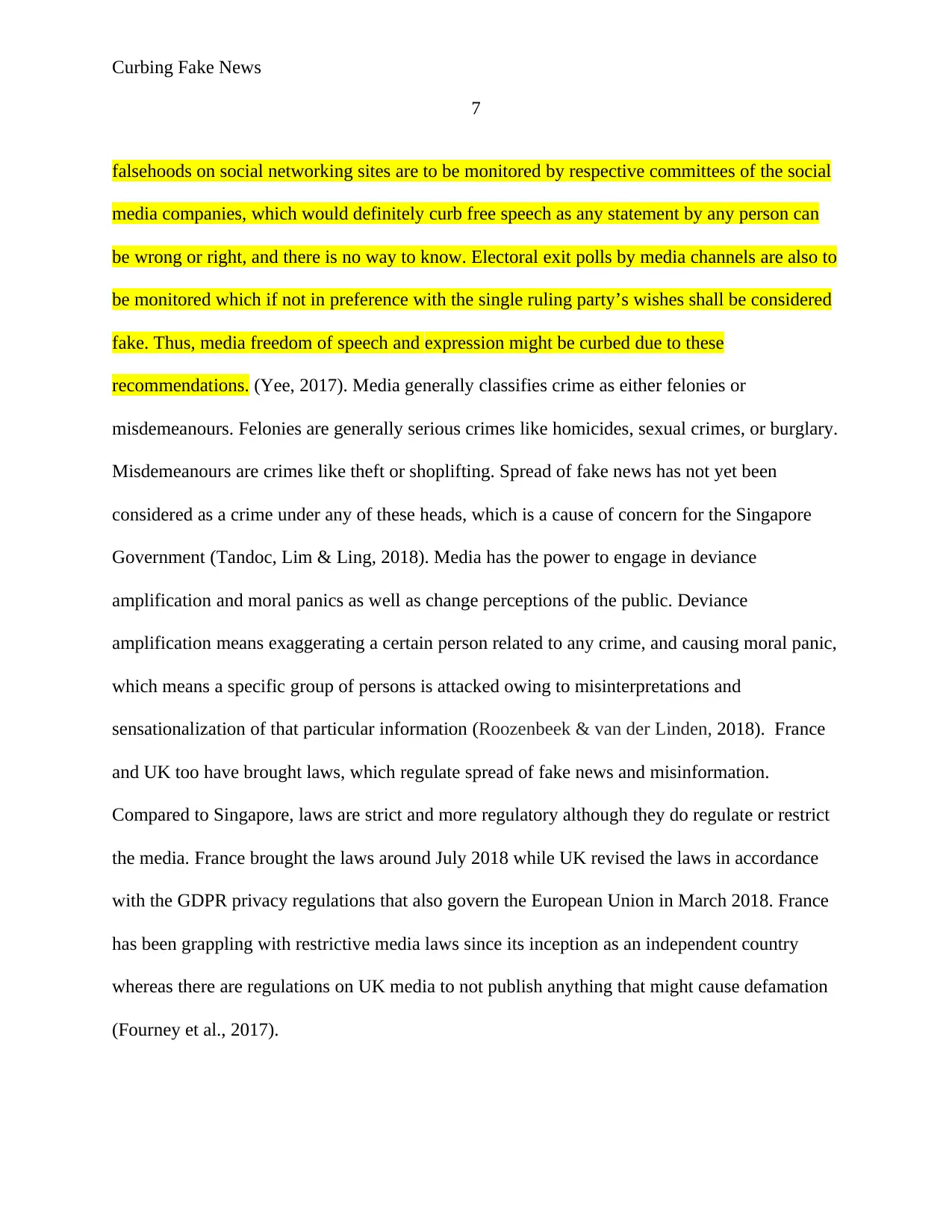
Curbing Fake News
7
falsehoods on social networking sites are to be monitored by respective committees of the social
media companies, which would definitely curb free speech as any statement by any person can
be wrong or right, and there is no way to know. Electoral exit polls by media channels are also to
be monitored which if not in preference with the single ruling party’s wishes shall be considered
fake. Thus, media freedom of speech and expression might be curbed due to these
recommendations. (Yee, 2017). Media generally classifies crime as either felonies or
misdemeanours. Felonies are generally serious crimes like homicides, sexual crimes, or burglary.
Misdemeanours are crimes like theft or shoplifting. Spread of fake news has not yet been
considered as a crime under any of these heads, which is a cause of concern for the Singapore
Government (Tandoc, Lim & Ling, 2018). Media has the power to engage in deviance
amplification and moral panics as well as change perceptions of the public. Deviance
amplification means exaggerating a certain person related to any crime, and causing moral panic,
which means a specific group of persons is attacked owing to misinterpretations and
sensationalization of that particular information (Roozenbeek & van der Linden, 2018). France
and UK too have brought laws, which regulate spread of fake news and misinformation.
Compared to Singapore, laws are strict and more regulatory although they do regulate or restrict
the media. France brought the laws around July 2018 while UK revised the laws in accordance
with the GDPR privacy regulations that also govern the European Union in March 2018. France
has been grappling with restrictive media laws since its inception as an independent country
whereas there are regulations on UK media to not publish anything that might cause defamation
(Fourney et al., 2017).
7
falsehoods on social networking sites are to be monitored by respective committees of the social
media companies, which would definitely curb free speech as any statement by any person can
be wrong or right, and there is no way to know. Electoral exit polls by media channels are also to
be monitored which if not in preference with the single ruling party’s wishes shall be considered
fake. Thus, media freedom of speech and expression might be curbed due to these
recommendations. (Yee, 2017). Media generally classifies crime as either felonies or
misdemeanours. Felonies are generally serious crimes like homicides, sexual crimes, or burglary.
Misdemeanours are crimes like theft or shoplifting. Spread of fake news has not yet been
considered as a crime under any of these heads, which is a cause of concern for the Singapore
Government (Tandoc, Lim & Ling, 2018). Media has the power to engage in deviance
amplification and moral panics as well as change perceptions of the public. Deviance
amplification means exaggerating a certain person related to any crime, and causing moral panic,
which means a specific group of persons is attacked owing to misinterpretations and
sensationalization of that particular information (Roozenbeek & van der Linden, 2018). France
and UK too have brought laws, which regulate spread of fake news and misinformation.
Compared to Singapore, laws are strict and more regulatory although they do regulate or restrict
the media. France brought the laws around July 2018 while UK revised the laws in accordance
with the GDPR privacy regulations that also govern the European Union in March 2018. France
has been grappling with restrictive media laws since its inception as an independent country
whereas there are regulations on UK media to not publish anything that might cause defamation
(Fourney et al., 2017).
Paraphrase This Document
Need a fresh take? Get an instant paraphrase of this document with our AI Paraphraser
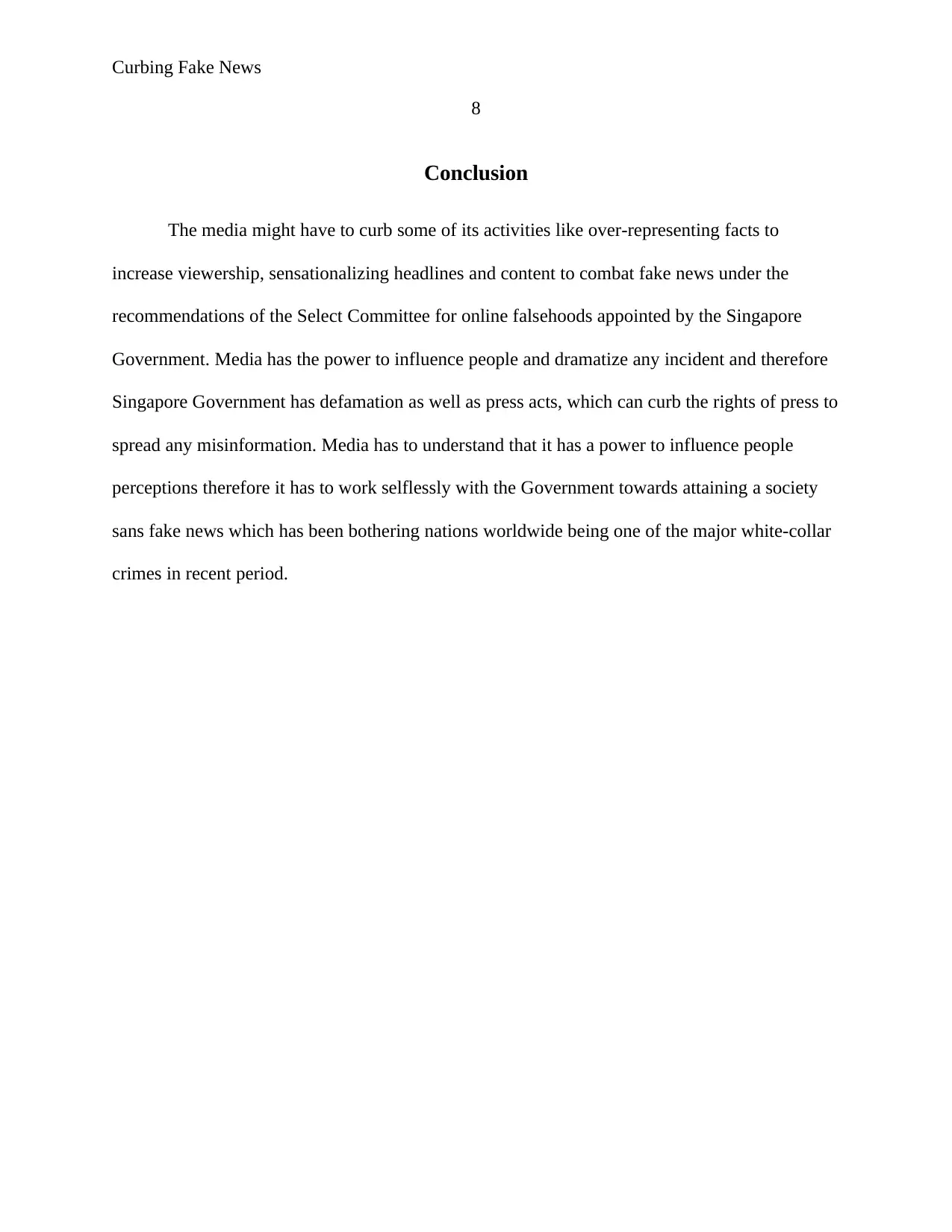
Curbing Fake News
8
Conclusion
The media might have to curb some of its activities like over-representing facts to
increase viewership, sensationalizing headlines and content to combat fake news under the
recommendations of the Select Committee for online falsehoods appointed by the Singapore
Government. Media has the power to influence people and dramatize any incident and therefore
Singapore Government has defamation as well as press acts, which can curb the rights of press to
spread any misinformation. Media has to understand that it has a power to influence people
perceptions therefore it has to work selflessly with the Government towards attaining a society
sans fake news which has been bothering nations worldwide being one of the major white-collar
crimes in recent period.
8
Conclusion
The media might have to curb some of its activities like over-representing facts to
increase viewership, sensationalizing headlines and content to combat fake news under the
recommendations of the Select Committee for online falsehoods appointed by the Singapore
Government. Media has the power to influence people and dramatize any incident and therefore
Singapore Government has defamation as well as press acts, which can curb the rights of press to
spread any misinformation. Media has to understand that it has a power to influence people
perceptions therefore it has to work selflessly with the Government towards attaining a society
sans fake news which has been bothering nations worldwide being one of the major white-collar
crimes in recent period.
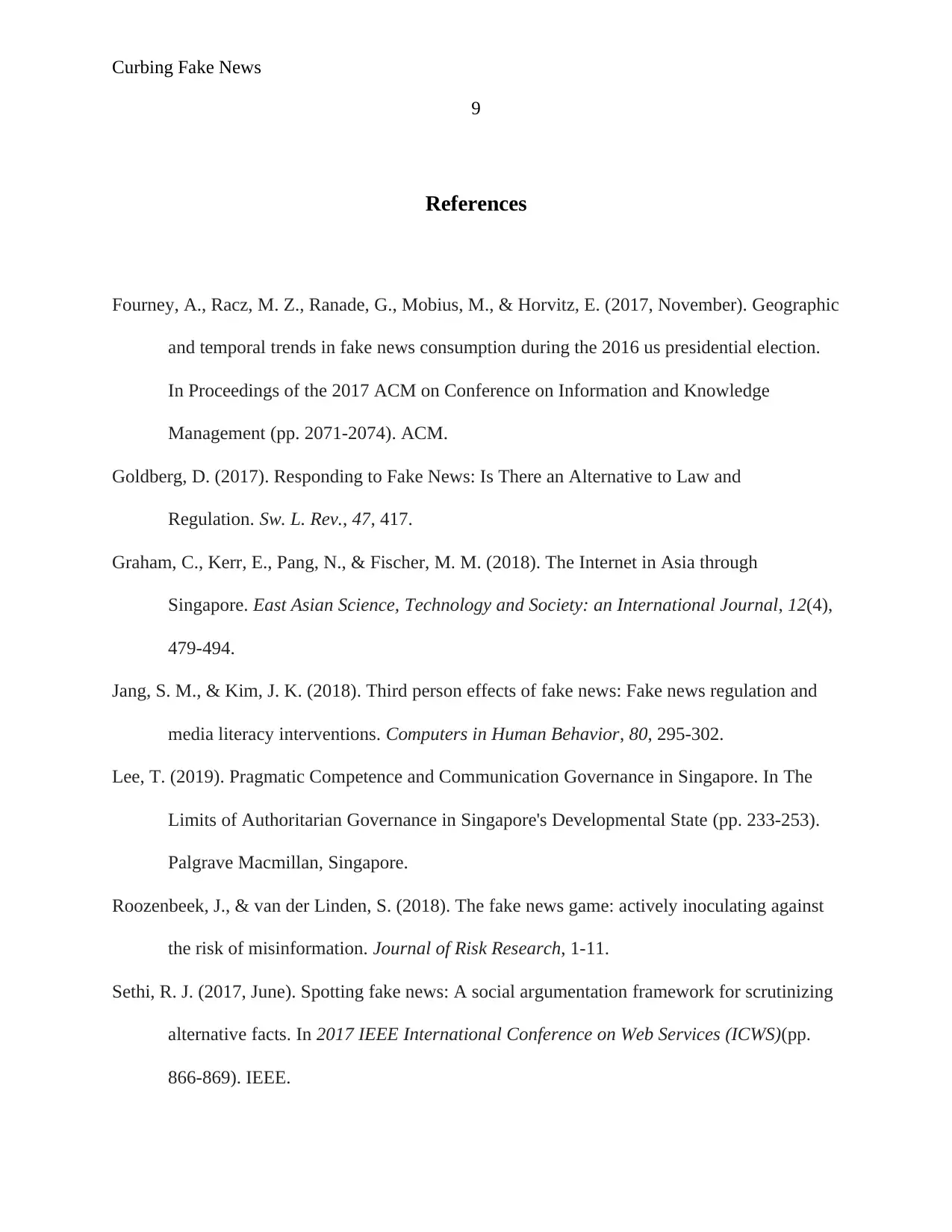
Curbing Fake News
9
References
Fourney, A., Racz, M. Z., Ranade, G., Mobius, M., & Horvitz, E. (2017, November). Geographic
and temporal trends in fake news consumption during the 2016 us presidential election.
In Proceedings of the 2017 ACM on Conference on Information and Knowledge
Management (pp. 2071-2074). ACM.
Goldberg, D. (2017). Responding to Fake News: Is There an Alternative to Law and
Regulation. Sw. L. Rev., 47, 417.
Graham, C., Kerr, E., Pang, N., & Fischer, M. M. (2018). The Internet in Asia through
Singapore. East Asian Science, Technology and Society: an International Journal, 12(4),
479-494.
Jang, S. M., & Kim, J. K. (2018). Third person effects of fake news: Fake news regulation and
media literacy interventions. Computers in Human Behavior, 80, 295-302.
Lee, T. (2019). Pragmatic Competence and Communication Governance in Singapore. In The
Limits of Authoritarian Governance in Singapore's Developmental State (pp. 233-253).
Palgrave Macmillan, Singapore.
Roozenbeek, J., & van der Linden, S. (2018). The fake news game: actively inoculating against
the risk of misinformation. Journal of Risk Research, 1-11.
Sethi, R. J. (2017, June). Spotting fake news: A social argumentation framework for scrutinizing
alternative facts. In 2017 IEEE International Conference on Web Services (ICWS)(pp.
866-869). IEEE.
9
References
Fourney, A., Racz, M. Z., Ranade, G., Mobius, M., & Horvitz, E. (2017, November). Geographic
and temporal trends in fake news consumption during the 2016 us presidential election.
In Proceedings of the 2017 ACM on Conference on Information and Knowledge
Management (pp. 2071-2074). ACM.
Goldberg, D. (2017). Responding to Fake News: Is There an Alternative to Law and
Regulation. Sw. L. Rev., 47, 417.
Graham, C., Kerr, E., Pang, N., & Fischer, M. M. (2018). The Internet in Asia through
Singapore. East Asian Science, Technology and Society: an International Journal, 12(4),
479-494.
Jang, S. M., & Kim, J. K. (2018). Third person effects of fake news: Fake news regulation and
media literacy interventions. Computers in Human Behavior, 80, 295-302.
Lee, T. (2019). Pragmatic Competence and Communication Governance in Singapore. In The
Limits of Authoritarian Governance in Singapore's Developmental State (pp. 233-253).
Palgrave Macmillan, Singapore.
Roozenbeek, J., & van der Linden, S. (2018). The fake news game: actively inoculating against
the risk of misinformation. Journal of Risk Research, 1-11.
Sethi, R. J. (2017, June). Spotting fake news: A social argumentation framework for scrutinizing
alternative facts. In 2017 IEEE International Conference on Web Services (ICWS)(pp.
866-869). IEEE.
⊘ This is a preview!⊘
Do you want full access?
Subscribe today to unlock all pages.

Trusted by 1+ million students worldwide
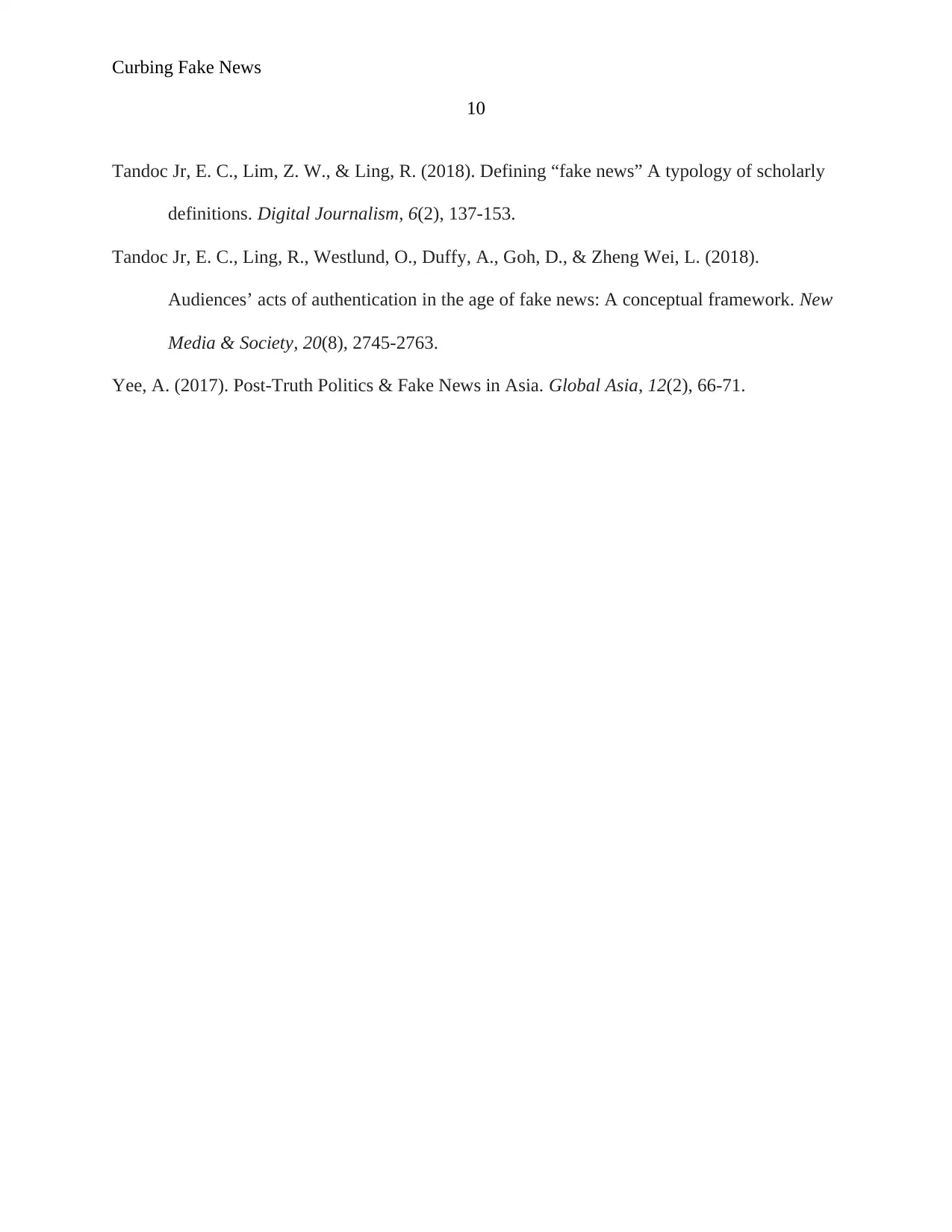
Curbing Fake News
10
Tandoc Jr, E. C., Lim, Z. W., & Ling, R. (2018). Defining “fake news” A typology of scholarly
definitions. Digital Journalism, 6(2), 137-153.
Tandoc Jr, E. C., Ling, R., Westlund, O., Duffy, A., Goh, D., & Zheng Wei, L. (2018).
Audiences’ acts of authentication in the age of fake news: A conceptual framework. New
Media & Society, 20(8), 2745-2763.
Yee, A. (2017). Post-Truth Politics & Fake News in Asia. Global Asia, 12(2), 66-71.
10
Tandoc Jr, E. C., Lim, Z. W., & Ling, R. (2018). Defining “fake news” A typology of scholarly
definitions. Digital Journalism, 6(2), 137-153.
Tandoc Jr, E. C., Ling, R., Westlund, O., Duffy, A., Goh, D., & Zheng Wei, L. (2018).
Audiences’ acts of authentication in the age of fake news: A conceptual framework. New
Media & Society, 20(8), 2745-2763.
Yee, A. (2017). Post-Truth Politics & Fake News in Asia. Global Asia, 12(2), 66-71.
1 out of 10
Related Documents
Your All-in-One AI-Powered Toolkit for Academic Success.
+13062052269
info@desklib.com
Available 24*7 on WhatsApp / Email
![[object Object]](/_next/static/media/star-bottom.7253800d.svg)
Unlock your academic potential
Copyright © 2020–2026 A2Z Services. All Rights Reserved. Developed and managed by ZUCOL.





